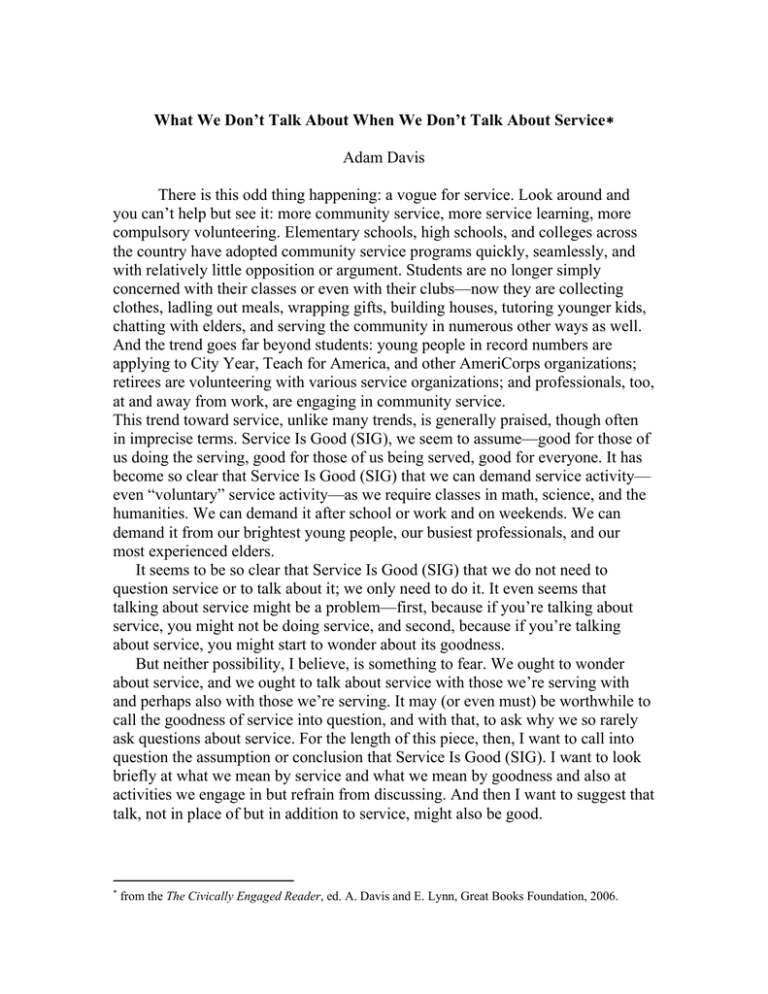Adam Davis
advertisement

What We Don’t Talk About When We Don’t Talk About Service∗ Adam Davis There is this odd thing happening: a vogue for service. Look around and you can’t help but see it: more community service, more service learning, more compulsory volunteering. Elementary schools, high schools, and colleges across the country have adopted community service programs quickly, seamlessly, and with relatively little opposition or argument. Students are no longer simply concerned with their classes or even with their clubs—now they are collecting clothes, ladling out meals, wrapping gifts, building houses, tutoring younger kids, chatting with elders, and serving the community in numerous other ways as well. And the trend goes far beyond students: young people in record numbers are applying to City Year, Teach for America, and other AmeriCorps organizations; retirees are volunteering with various service organizations; and professionals, too, at and away from work, are engaging in community service. This trend toward service, unlike many trends, is generally praised, though often in imprecise terms. Service Is Good (SIG), we seem to assume—good for those of us doing the serving, good for those of us being served, good for everyone. It has become so clear that Service Is Good (SIG) that we can demand service activity— even “voluntary” service activity—as we require classes in math, science, and the humanities. We can demand it after school or work and on weekends. We can demand it from our brightest young people, our busiest professionals, and our most experienced elders. It seems to be so clear that Service Is Good (SIG) that we do not need to question service or to talk about it; we only need to do it. It even seems that talking about service might be a problem—first, because if you’re talking about service, you might not be doing service, and second, because if you’re talking about service, you might start to wonder about its goodness. But neither possibility, I believe, is something to fear. We ought to wonder about service, and we ought to talk about service with those we’re serving with and perhaps also with those we’re serving. It may (or even must) be worthwhile to call the goodness of service into question, and with that, to ask why we so rarely ask questions about service. For the length of this piece, then, I want to call into question the assumption or conclusion that Service Is Good (SIG). I want to look briefly at what we mean by service and what we mean by goodness and also at activities we engage in but refrain from discussing. And then I want to suggest that talk, not in place of but in addition to service, might also be good. ∗ from the The Civically Engaged Reader, ed. A. Davis and E. Lynn, Great Books Foundation, 2006. Service The kind of service at issue here is community service, that is, “voluntary” service, which usually implies service to those in need. Neither the waiter (who serves those with means) nor the criminal (who may serve those in need but doesn’t exactly choose to do so) is engaging in precisely the kind of service activity I’m talking about. What separates our form of service from other forms of service is above all its voluntary character, which is revealed or confirmed by the fact that service work is nonremunerative, or barely remunerative. People either don’t get paid or get paid badly to do this kind of service work, but that’s okay; it’s not, we’re told, about the money. AmeriCorps volunteers, for example, receive a stipend and some help with tuition, but in general that’s not why, really why, they’re doing it. We don’t do service to make money but because service is good in and of itself. To put it another way, community service isn’t service work; even if checks are cut and hours are counted, community service somehow exists outside the realm of wages and timecards. On its own terms, for reasons internal to the activity itself, Service (S), we say, Is Good (IG). If we don’t serve for money, why do we serve? There are no doubt more reasons to engage in service than can be catalogued, and every act of service probably involves some combination of reasons, but here I’ll try to identify and separate out what I see as the most fundamental and common reasons. And it seems sensible, on account of their richer lexicon, their history of service, and their expertise, to begin with the devout among us. The devout might say that we serve because we love God. Or they might say: there but for the grace of God go I, and since the grace of God has temporarily given me more than it has given you, I will freely choose to serve you. In both cases, the explanation for service derives from the belief that we are all children of God and we are all in need. I happen to have more by way of earthly goods than you at this moment, and so I will share. But both of us are in need of spiritual goods, in need of God, and by serving others we serve God. Earthier but still pious folks might say that we serve because we love others; we serve because we want to help others; we serve because we share with others. Here the emphasis is not on the next world but on this world, though again the impulse to serve derives from a principle of commonality, of what we share. We may or may not all be children of God, according to this approach, but we are all children of the earth, and so, whether we choose to admit it or not, we share. This world is small, so your ills are my ills; your goods are my goods. The potentially more cynical companion to this view is that we serve not because we share with others but because we identify with others. I know what it’s like to be in your shoes. In fact, thanks to my imagination, I am in your shoes. I choose to serve you because I see you suffering, I can’t help but imagine myself suffering, and I don’t want to suffer. By alleviating your suffering, I take care of myself. This is a potentially cynical view because the server emphasizes her own 2 good rather than that of whomever she serves. It’s good for you, yes, but I’m doing it because it’s good for me. We become significantly more cynical when we turn to those who explain service by appealing to the reputation it wins for the server. Here the good of the server remains primary, but the good of the served is tertiary rather than secondary. I ladle food onto your plate because others who see me do so will think better of me. And, oh yeah, you won’t be quite so hungry. With this last explanation, we move back toward the devout, though from the other side. Now it is not love that explains humble service but guilt. I am bad, I am evil, I am a sinner—and I know my sinful nature is seen. By serving I acknowledge my consciousness of my sinful nature and mitigate it somewhat. I suck, please let me serve you, perhaps I will suck somewhat less. Why serve? Here are five reductive answers: (1) we are God’s children; (2) we share the earth; (3) I find myself in you; (4) I win praise by serving you; (5) I suck. Goodness In each of the above cases, we explain service by referring, usually in a tacit way, to a good or some goods. But the location and content of these goods appear to change as we move from one set of reasons to the next. Here I mean only to point out that service might be good for me (doing the serving), it might be good for them (being served), it might be good for us (as a society), or, weirdly enough, it might be good for God (though this would seem to be presumptuous to the point of impiety). Some might also make the case that service is simply good, in some abstract and objective way, without necessarily being good for anyone. Service, to repeat, might be good for the server, good for the served, good for all of us, good for God, or objectively good. Whomever service is good for (or wherever the goods produced by service reside), we should also note that different reasons for service appeal to different understandings of what the good consists (or the goods consist) in. Service Is Good (SIG) because of the aid it brings to those served, because of the habits (of discipline, humility, and generosity) it instills (probably in the server rather than the served), because of the pleasure it provides (again, most likely to the server), because of the sense of unity it begets among all parties involved, because it is divinely sanctioned, because of its capacity to move the way things are toward how they ought to be. That is, service might produce goods that are necessary, educational, pleasurable, beautiful, holy, or right. Service activity, then, might produce goods external to the transaction itself, internal to the transaction itself, both, or neither. Any particular act of service could be demeaning to the served and uncomfortable for the server, but it may at the same time provide the served with what she needs. You serve me a meal at a soup kitchen, and this puts my need on display, which demeans me and makes you uncomfortable, yet my hunger is appeased. We might therefore call this act of 3 service good chiefly because of the positive consequences of the act, the external goods, and despite the difficulties internal to the act. Or the reverse could be true: an act of service could lead to no positive external outcome—or even to a negative external outcome for both parties—but might fill both the server and the served with a feeling of dignity or justice, pleasure or love. You serve me a meal at a soup kitchen, and this pleases me (it’s nice to be given a free meal) and makes you feel holy (it’s nice to choose to give someone a free meal), but relative to everyone else at the kitchen, I’m not really in need. I come out of there having learned how I might preserve a little more cash to bet with, you come out feeling you’ve done your part to save the world, and so this act of service feels good to the parties involved but would most likely not be called good according to any reliable external standard. This distinction between external and internal goods is in many ways too extreme, because sought-after goods are rarely only internal or only external, but the distinction might begin to help us see that service activity is complex. And only after we acknowledge the complexity of service—with its multiple parties and various goods—can we begin to sort out better acts of service from worse. If, on the other hand, we remain at the acronymic level—SIG—we may find ourselves shortchanging all three abbreviated terms (service, is, and good). It is simply the case that some service activity—ill-conceived or unwanted or badly executed or questionably motivated service—might not be good. Some—and perhaps all—service activity might be both good and bad. At the very least, then, we should recognize that no matter where one comes down on the goodness of service, service, in principle and in practice, is not simple (SINS). In short, the belief that service is good (SIG) should not mean that we blind ourselves to the complexity of service (SINS). Anyone who has served or been served by another—in short, anyone—can testify to the range of feelings such an exchange produces: serving someone, I might feel close to that person or ashamed at how close I am to someone I do not know, or I might expect more signs of gratitude, or I might feel any number of other things; being served, I might feel close to the person serving me, or ashamed, or grateful but estranged, or any number of other things. This range of possible feelings attests to the fact that service is complex as well as deep. If, on account of its apparently voluntary, unpaid character, service can seem like play, it can also, on account of its emotional and moral significance, seem more serious than anything else we could conceive of or do. Yet service is something we rarely discuss. What We Do; What We Do Not Discuss Many of us pick our noses. Few of us talk about it. Our silence on the subject of nose picking seems to be related to the unsavory character of the activity. It is bad; we don’t discuss it. 4 All of us wipe (I hope). Few of us talk about it. Our silence on the subject of wiping, however, does not derive from our collective disapproval of the activity. In fact, I think we would all say, if pushed, that wiping is good (WIG). But we only want people to do it, not to discuss it. To discuss it would be in bad taste (consider this paragraph). We could talk about the very first thing we do when we sit down in the driver’s seat of our cars, but we don’t. We don’t discuss this because nobody cares, because it’s insignificant, because it’s boring. We could talk about what we imagine while the attractive person behind the counter serves us coffee, but we don’t. We don’t discuss this because, again, it is bad, or in bad taste, or boring. Then, too, many of us follow an unwritten rule not to talk about politics or religion. But this impulse to avoid talk of politics or religion does not develop because the avoided subject is bad, or in bad taste, or boring; rather, politics and religion are things we care about, and because we care about them, we might disagree with each other, even disagree hotly, and if we disagree hotly, something must be wrong. So we don’t talk about them. Many of us also do not talk about money—about how much we make, how much we pay to live where we live, how much our families do or do not have. We don’t talk about money, I want to suggest, because of our peculiar blend of democratic political culture and capitalist ethos. (There may also be some residual aristocratic notion that talk of money is vulgar, or cheap, though that would mainly explain why the wealthy among us remain reticent here.) We think of ourselves as democrats, or as citizens of a democracy, so we like to think that we are all equal, whatever that might mean. But we also think of ourselves as free marketers, and we seem to believe that those who have money have earned it, or deserve it, and so money can seem like a measure of merit. To talk of money would then be to talk of difference, and not just any difference, but difference of worth and power. To talk of money would be to put our inequality in front of us. Now we return to our silence on service. To talk of service, to really look at it, would require us to look closely at inequality. This is a difficult and uncomfortable place to look. Inequality and Service Here is an exaggerated pass at the relation between inequality and service: I serve you because I want to; I choose to. You receive my service because you have to; you need it. I live in the realm of freedom; you live in the realm of necessity. Serving you, I confirm my relative superiority. Being served, you confirm your inferiority. By my apparent act of humility, I raise myself up. “The happiness,” as Nietzsche writes, “of slight superiority,” only we don’t say so. Instead we say very little about why we and especially our kids serve. It’s good, that’s why; our kids learn valuable lessons and those they serve receive 5 valuable help. But these lessons are complicated and the help is not always helpful. To pretend otherwise is to pass on a dirty little secret with the tacit message that it best be kept secret. What is the dirty little secret? Maybe this: we cherish inequality. We don’t say this, of course, and we may not even think it, but we show it by what we do and especially what we accept. Look at schools, jobs, cars, clothes, teeth, bellies, eyes. Look anywhere at all and you’ll see signs, indisputable signs, of inequality. We are told that “all men are created equal,” and we are taught to believe it. We may be taught to believe this more deeply than any other single thing. But this claim—”all men are created equal”—is a self-evident falsehood. It is simply and obviously not the case that men—people—are created equal: we do not possess equal gifts and we do not find ourselves with equal opportunities to make our way in the world. We are equal only with respect to our end. Our beginnings, our points of entry, could not be more unequal, and the beginning, as Aristotle tells us, is more than half. The beginning, as any newspaper or attentive glance can tell us, is much more than half. Here again we return to service. Those who serve set out to help, yes, but they also set out to bridge a gap, to remedy the consequences of inequality. To the extent that we engage in service because we think it’s good for those we’re serving—and here we have learned to tread carefully: we’re not improving those we serve; we’re only improving the conditions in which they find themselves (again, the wishful insistence that all are created equal)—we seem by our activity to declare that the gap is wrong. We who have more—more money or more time or more education or more energy or more freedom—should close the distance between ourselves and those we serve. We should move toward equality. Do acts of service move us toward equality? Might some acts of service enshrine and even extend the very gap they mean to bridge? Where will the server be, five years from any particular service transaction? Where will the served be? How has this transaction, this series of transactions, contributed to the socioeconomic and perhaps especially to the psychological positions in which these people find themselves? What do we learn, when we serve? What do we learn when we are served? What don’t we talk about when we don’t talk about service? We do not like to be seen as hypocrites and we certainly do not like to see ourselves as hypocrites. So when we say that everyone is equal, we want to believe it. But equality is threatening; it might rob my loved ones of their security; it might rob me of my freedom, my relative rank. It feels good to look down, better still if I can tell myself I’m ready to serve those less fortunate (that is, less) than me. That way I’m not just better, I’m also good. 6 Service Is Not Simple I have not meant to suggest that service is bad, or at least not that it is necessarily bad, or that inequality is bad, or, for that matter, good. Instead I want to suggest that inequality is present and in many ways desired and that this accounts in large part for the fact that service is not simple (SINS), no matter what we pretend. The crux of this piece, however, might be simple. Here it is: by pretending service is simple (SIS), we risk turning service bad—bad for the served and for the server. And by pretending service is simple (SIS), we saddle ourselves with a burden we do not acknowledge. It may originate as a salutary burden, for it derives from and endeavors to satisfy our aspiration to live more justly, to do right by those we are with and among. But it remains a burden, and the less we acknowledge it, the heavier it gets. 7





